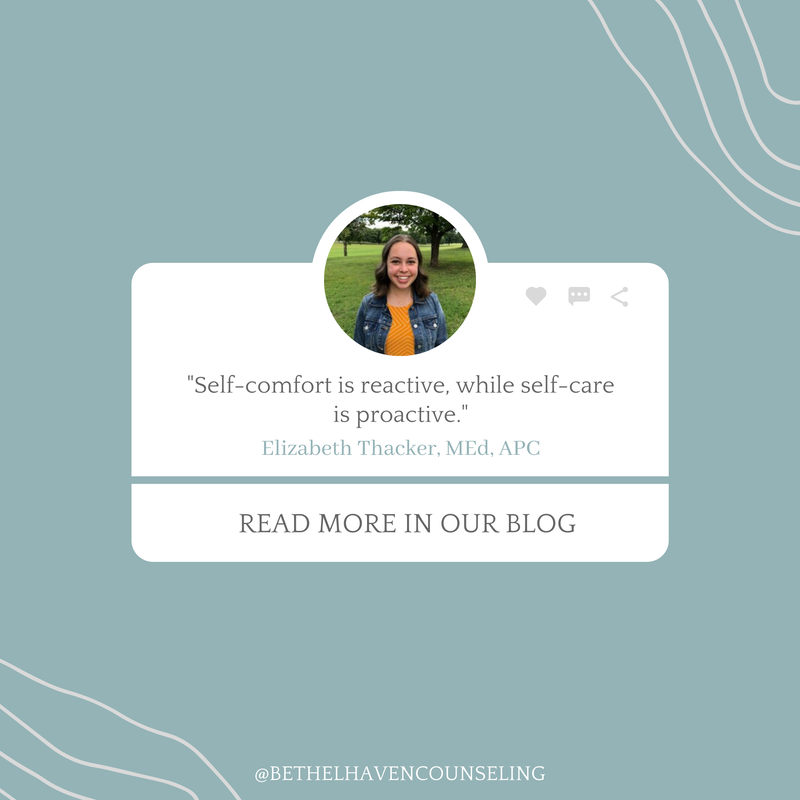Elizabeth Thacker, MEd, APCBethel Haven Staff Therapist Self-care is a popular term thrown around these days. I often ask my clients “how are you taking care of yourself?” because if we don’t take care of ourselves, we are going to get burnt out. The popular understanding of self-care includes things like bubble baths, watching movies, or doing some skincare. And these are important and wonderful things to do if you are able but might better be categorized under the idea of “self-comfort.”
I was first introduced to the idea that there is a distinction between “self-care” and “self-comfort” a few months ago while reading Sarah Bessey’s book, Miracles and Other Reasonable Things (I highly recommend all her books, by the way). This book details some of Bessey’s struggles with her faith and her experience recovering from physical injury. At one point in her story, Bessey notes that there is a difference between “self-care” and “self-comfort” and this concept has stuck with me. Bessey’s book led me to investigate this concept a little more. I haven’t talked to anyone recently who hasn’t needed a little more care and comfort, so I wanted to share what I learned about them and when they are most appropriate. One way I can think to illustrate the difference between these two concepts is that self-comfort is a warm bubble bath, while self-care is regular personal hygiene. Self-comfort is often easy and helpful in the moment, but fleeting, while self-care can sometimes be difficult and challenging, but sets us up for healthy practices in the long term. A good analogy would be that self-comfort is what you do when you have hit “E” on your fuel gauge, while self-care is what you do to keep your tank from emptying out in the first place. Self-comfort is reactive, while self-care is proactive. My understanding of self-comfort is self-soothing. When we are stressed or overwhelmed, needing warmth, or a break, self-comfort is a wonderful thing to utilize. Take that break and watch your favorite show. Enjoy that candy you’ve been saving for a while (it’s called comfort food for a reason!). Go for that run to get out your nervous energy. Self-comfort helps us regulate in the moment when things get to be too much. Self-care is what we do to prevent us from getting overwhelmed as often or as extremely. These things can look like practicing mindfulness, making sure you are eating enough every day, setting up a proper sleep routine, budgeting, getting outside and moving your body, going to therapy, unplugging from social media, etc. When these kinds of things become a regular practice, you will be better able to handle when things become overwhelming and stressful because your tank is fuller than if you hadn’t been taking care of yourself. Self-care and self-comfort are both important and necessary at times. It’s not that one is harmful and one is healthy, but determining which is appropriate is important. Below is an incomplete list of suggestions that can help you get started on your way towards proper self-comfort and self-care. Self-comfort - things you can do when feeling overwhelmed
Self-care - things you can do regularly to help prevent being overwhelmed as often
If you want to learn more about how to better take care of yourself, therapy can be a great place to start. A counselor can help you find what works for you and encourage you to make the changes you have been wanting to make.
0 Comments
Leave a Reply. |
Bethel HavenWritten by our counselors to help promote your help, hope, healing Archives
June 2021
Categories |

1622 Mars Hill Road Suite A Watkinsville, GA 30677
P: 706-310-9046
[email protected]
Bethel Haven, Inc.
Copyright © 2016

 RSS Feed
RSS Feed
